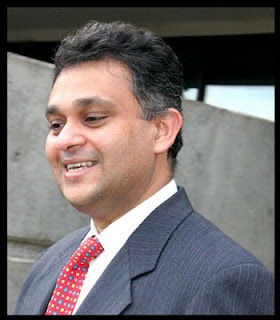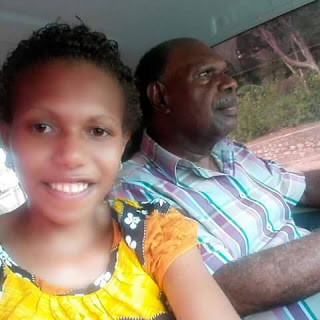Motigate: Why Somare was right.
By Susan Merrell
The current political impasse in PNG can best be summed up simply as a dispute between the judiciary and the executive.
The judiciary have under their arm the PNG Constitution and are using it as a WMD (weapon of mass destruction) with the approval of Sir Michael Somare who has most to gain by adherence to the letter of it in the present context.
On the other hand, the O'Neill/Namah government are claiming the moral high ground with their popular mandate backed up by their legislative prowess – thwarting and overriding the Constitution at every turn.
Part of the O'Neill/Namah strategy has been to call into question the integrity of the judiciary with repeated attempts to suspend the Chief Justice for impropriety. Indeed the Chief Justice himself has done the same by refusing to recuse himself from the cases where there has been a glaring conflict of interests.
The Moti case in parliament is a complete change of tack by O'Neill/Namah. Instead of attacking the judiciary, O'Neill/Namah government have decided to hoist the Grand Chief by his own petard - using the Moti case.
The Moti case brings up allegations of breaches of the constitution and the law by Somare, especially over the PNGDF flight that took Moti to the Solomon Islands from PNG in 2006.
If found guilty of the breaches, no more will Somare be able to fashion himself as a champion of the constitution thanks to the Defence Inquiry and the Ombudsman's Report on Moti.
But hold on. The judiciary is only one arm of the government (something the O'Neill/Namah faction has been quick to emphasise lately when it flatters their own prejudices) and what Somare did was well within his power as the Chief Executive of Papua New Guinea and was not so much about exercise of power as the fulfilment of international obligations.
Somare was obliged to do what he did because Papua New Guinea is a signatory (Acceded in 1986) to the Convention on the Status of Refugees 1951 (revised in 1967).
Evidence also points to the fact that that judicial mistrust is not a new or isolated phenomenon in Papua New Guinea and could well have been in play in 2006.
Political asylum in PNG and the courts.
The ‘Convention’ defines a refugee as someone who has a “…well-founded fear of being persecuted for reasons of race, religion, nationality, membership of a particular social group or political opinion.” When Moti sought political asylum in the Solomon Islands chancellery in Port Moresby he had every reason to believe he qualified for reasons too numerous to mention here but reasons which, nevertheless, been well-publicised both by myself and other commentators.
Furthermore, to establish Moti’s status as a refugee, a diplomatic letter informing the government of PNG that the Solomon Islands government had granted diplomatic asylum to Moti was quickly despatched by the then Prime Minister of the Solomon Islands, Manasseh Sogavare. He stated:
“…Mr. Moti must be given diplomatic protection and offered sanctuary on our sovereign soil [the Solomon Islands Chancellery in Port Moresby]. I trust that you will do the needful for him while we secure judicial orders for his release and safe transit from Papua New Guinea to Solomon Islands”
But, why involve the judiciary at all?
Article 33 of the Convention on the Status of Refugees clearly states and establishes the principle of ‘non-refoulement’ whereby “no contracting state [PNG and the Solomon Islands] shall expel or return a refugee in any manner whatsoever to the frontiers of territories where his life or freedom would be threatened on account of his…political opinion.”
Why were the PNG courts even contemplating the extradition of Moti to Australia?
Consider: the morning of the day that Moti was flown out of PNG, Justice Cathy Davani had decided to adjourn the court case for two weeks in order to apprise herself of the appropriate law. Well, she’s either very busy, a really slow learner or there was another imperative, especially as Moti’s continued residency in Port Moresby was problematic for all concerned.
So whose interests were served by this curious delay?
Moti’s delayed arrival in the Solomon Islands would have meant him being unavailable to advise the Solomon Islands' Prime Minister on an upcoming vote of no confidence. Was that just pure serendipity for the Australian authorities who had been doing their utmost to destabilize this government that was so openly antagonistic toward them?
The role of the executive
Moti’s asylum and safe passage to the Solomon Islands could more correctly have by-passed the courts and been handled at an executive level – government to government and diplomatically.
And, according to the two inquiries, the PNG executive did, in fact, do this. However, the inquiries, rather than supporting the actions, have found against them. The then Prime Minister has not been praised for his actions, but vilified.
Surely, the onus was on him to make sure the sovereign state of PNG honoured its own international obligations and not subjugate them to Australia’s agenda.
Furthermore, the use of the PNG Defence Force to carry out such an operation is in direct accordance with the Constitution of PNG where one of the functions of the Defence Force is “…the fulfilment by Papua New Guinea of its international obligations.”
Nevertheless for the PNG executive to pre-empt a court decision, there must have been powerful imperatives.
For me, this is the most compelling evidence that the Grand Chief had misgivings about the neutrality of the PNG courts.
Sir Michael certainly had misgivings over who was commanding his agencies.
“Police goes and does this,” he said in the press at the time about Moti’s arrest, “who are they listening to, who is commanding them?” PNG is a sovereign nation; a Prime Minister shouldn’t have to ask that question.
Was it the force of Australian insistence that was making the tail wag the dog in PNG?
Was undue Australian interest evident in the Defence Inquiry and the Ombudsman's Report?
The accusation of undue Australian interest in the Moti case has been one of the abiding concerns of Moti's lawyers, one of whom has commented:
“Has it ever occurred to anyone, that this generous aid we receive [in PNG and the rest of the Pacific] could be a fishbone stuck in the judicial esophagus of our courts, an unnecessary, artificial and improper fettering or corruption of judicial discretion?”
Taking umbrage with the PNG Ombudsman’s report (amongst other things), he pointed out that the Australian government funnels millions of Kina into both Transparency International and the Ombudsman Commission every year.
“Australia has created so much financial rapport and institutional loyalty within these organizations,” said the counsellor, “that in desperate times like this it can be called in.” Could this be precisely what happened?
For the Chief Ombudsman of PNG, Mr. Chronox Manek, before becoming Chief Ombudsman was the recipient of a generous Ausaid scholarship that funded his further education in Australia. Prior to this he was the DPP that prosecuted the Moti case in PNG.
Subsequently, in the Ombudsman’s Report, he found that Moti should not even have been in that court as his arrest was unlawful. However, at the time it did not stop him from yelling “belt the shit out of them,” - 'them' being Moti’s lawyers on hearing that Moti was not in court the morning after he'd been arrested at Jacksons Airport.
Manek's enthusiasm for this task was equally matched by the Australian authority’s enthusiasm to have Moti extradited to Australia
If it's good for the goose…
In this current political impasse, not everything the judiciary has done is right nor everything that the executive has done wrong. But equally, as in this current situation, so it is for the situation that occurred with Moti in 2006.
Realpolitik is what the O'Neill/Namah faction is exercising to stay in power…well… in realpolitik, executive powers must be exercised to meet the international obligations of a sovereign state – that's what Somare did.








Comments
Post a Comment
Please free to leave comments.